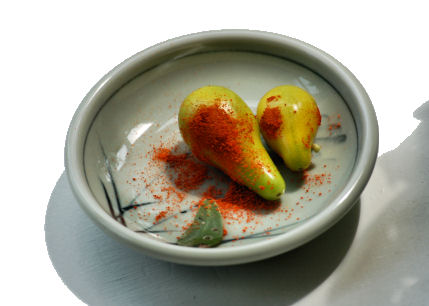
1.
We’re eating Korean soup tonight. Yook gae jang — shredded beef with cellophane noodles, scallions, and some long, fibrous mysterious vegetable. And spice — mouthfuls of red oil that make my nose run and my tongue sing. I am in love with the man across the table whose nose is running too. We glisten and are happy. Happiness is the long tails of soybeans slicked with sesame oil, the strings hanging from our mouths. We sip soup and poke at condiments with our wooden chopsticks — the kind that snap and splinter but who cares? I skewer a piece of jellied fishcake; bring it quivering to his lips. Another new, unexpected texture. When we eat together for the first time, it is before knowledge. Before the waitress knows our spice preferences: his flaming, mine, not meek but milder. Before she has suggested other menu items (Dol sot bimbim bab crisping in hot Korean crockware) and even steered us clear of some (codfish soup—bland, no depth, not good). All before we know where our tastes will take us. I am a self-proclaimed gourmand, have tried everything offered me at least once, but I have never before this first night eaten the Korean pickled cabbage called kimchi. I know nothing of the way its slight carbonation will incite, the way its crunch will satisfy. It’s a revelation, that first bite. I feel extended; I surpass myself. The whole room ferments! Poetry! Kimchi! Philosophy! Later, when we sit kissing on my second-hand couch, he will exclaim, “I love your eyebrows!” and I will touch them and fall.
2.
Food is love. Samuel Butler said, “Eating is touch carried to the bitter end.” I understand. I was in Paris with friends. We sat in a park where parents played with their children, bundled in colorful wools for the early March chill. They kicked yellow balls, ran laughing after each other, their hoods flapping behind them. “I want to eat them!” I exclaimed. I am 32 years old and childless. I am childless and in love with a man who’s not sure he wants children. Some days I crave. I am a lean witch cackling hungrily into a bone-cold wind.
3.
In my twenties, I was voted “Most Succulent” among my closest friends. We had just seen a film in which plane crash survivors must resort to cannibalism among the wreckage and the snow. After, it was decided that my ample figure paired with my high energy would make for the tastiest meat. We made a pact: “If we ever crash on top of a snow-topped mountain and I die, you have my blessing to eat me.” Blessing: an invocation of good fortune. If we crash and I die, I hope they are blessed with the warmth of a fire and time for slow cooking, for dining with relish and reverence, knowing that my spirit hovers, toasting their survival.
4.
For some, food is an inconvenience, something that wastes time. No. Food extends time, slows it for us generously. I cook because I believe in a slow life, a life of praise. I cook for my friends because I see them as divine. I cook to make holy moments, to call out and to reflect. I cook complex recipes in atonement. I gave up religion long ago. Now Sundays are for another kind of supper—one that acknowledges the sacrifices of human relationships. Sundays are for mundane tomato sauce stirred through with thyme and oregano and worship for the sensual world. It’s a kind of worship that makes it impossible to ignore the implication of the body, the way food changes us, fills us with our own good, hearty love. Food is worship and God, to me, is kimchi, kalamata olives, artichoke hearts and roasted garlic popped hot from its skin and spread warm with butter on bakery bread. God is lamb shanks braised long in orange juice and cabernet; is chopping Spanish onions with a heavy knife; is bittersweet chocolate chunked from dark Swiss bars. Is bittersweet entirely.
Sheila Squillante’s poems and essays have appeared in such places as Quarterly West, Prairie Schooner, The Southeast Review, Phoebe, Glamour Magazine, TYPO, Unpleasant Event Schedule and Literary Mama. A recipient of a fellowship from the MacDowell Colony, she works as the associate director of the MFA program and a lecturer in English at Penn State. She lives in central Pennsylvania with her husband and son.
photo by Dinty W. Moore

1 comment
Sergio A. says:
Jan 4, 2024
Got so hungry reading this